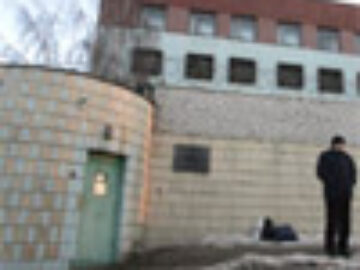Incarceration conditions in Akrestsin Street equated to tortures

The head of the OSCE office in Minsk Hans-Johan Schmidt hasn’t visited in prison the activist of the civil campaign “European Belarus” Alyaksandr Atroshchankau, but has expressed concern over the incarceration conditions in the detention centre in Akrestsin Street.
The Ambassador has written that in a letter to Alyaksandr Atroshchankau’s wife. Alyaksandr Atroshchankau is serving a term in the detention centre in Akrestsin Street in Minsk.
It is stated in the letter that the OSCE Office representatives have many times visited the prison in Akrestsin Street. “Information about these visits was distributed through our reports to the OSCE bodies in Vienna and to the OSCE member countries. Within the mandate of the OSCE Office we shall continue to discuss with competent bodies of Belarus the questions of incarceration conditions in the detention centre in Akrestsin Street, which cause concern of our office,” the OSCE Ambassador said.
As we have informed, Darya Korsak addressed the head of the OSCE Office with an appeal to visit the prison in Akrestsin Street where her husband arrested on political grounds is kept. The letter had been caused not only by a concern over the state of health of Alyaksandr Atroshchankau, to whom an ambulance was called in into the prison because of a heart problem. In the letter of Darya Korsak problems are enumerated which all political prisoners in Akrestsin Street face, and to which international organisations are to pay attention, especially those which are present in Belarus. Moreover, an “election” is to take place in the country soon, when Belarusian prisons will be filled with political prisoners traditionally. During the latest presidential “elections”, according to human rights organisations, there were more than 1,000 political prisoners in the country.
Conditions in prison in Akrestsin Street
– Persons imprisoned on political motives (according to the qualification of Amnesty International and other international organisations) are kept in the same ward with homeless persons, mentally disabled persons and criminals.
– Because of insanitary conditions and absence of due medical assistance, there is a high chance to contract infective diseases and gastrointestinal problems.
– Wards do not have normal illumination, and as a result, even after short terms of incarceration eyesight of prisoners drops considerably.
– Low-quality food and prohibition to bring food parcels exhaust human body and cause serious diseases.
– Walks which are to be given under the law, are not granted.
– Prisoners do not have a possibility to write to their families, who have no information about the incarceration conditions and state of health of their loved ones.
– There are no normal conditions for sleeping, and prisoners sleep on wooden platforms without bedding.
– It is forbidden to switch of or curtain the light in the wards at night, which later causes sleep disorders.
Darya Korsak: “I am afraid for my husband”
In an interview to the Charter’97 Darya Korsak told that political prisoners in Akrestsin Street are kept in conditions that humiliate human dignity. These conditions are equated to tortures by human rights watchdogs.
“I am greatly concerned by the state of health of my husband. He had health problems on the first day in Akrestsin Street, and an ambulance was called in to him. I have written a letter to the OSCE, as I have fear for Sasha. During the last arrest before the European March he had serious health problems. I had fever, high temperature, and as an answer to my pleas I was told by Akrestsin Street workers: “If he is here, he is healthy”. I know that political prisoners are not taken to walks, they serve the sentence in intolerable conditions. Knowing that my husband has heart problems is especially difficult for me,” Alyaksandr Atroshchankau’s wife said.
As we have informed, an activist of the civil campaign “European Belarus” Alyaksandr Atroshchankau was detained on 12 June during his visit of the KGB Minsk and Minsk region directorate. He has been gaining for more than six months for the office equipment, seized ahead of the European Union, held on 14 October in Minsk, to be returned to him. Police and KGB officers rushed the apartment, rented by Alyaksandr Atroshchankau. Police officers said there was a “dead body smell” in the apartment and neighbours had allegedly complained about it. As the result two computers and different archive materials were seized from him. Atroshchankau served an administrate arrest on a traditional accusation – “using of foul language in a public place.”
The activist came to the KGB Directorate to continue examination on 12 June. However, instead of judicial examination, Atroshchankau was guarded to the Tsentralny district court of Minsk, where he was sentenced to 15 days of arrest for “contempt of court,” allegedly taken place on 22 April in the Tsentralny district court towards judge Alena Illina, who sentenced Andrei Kim to one and a half year in penal colony and other participants of a protest action of entrepreneurs, held in Minsk on 10 January, to correctional labour and fines.
